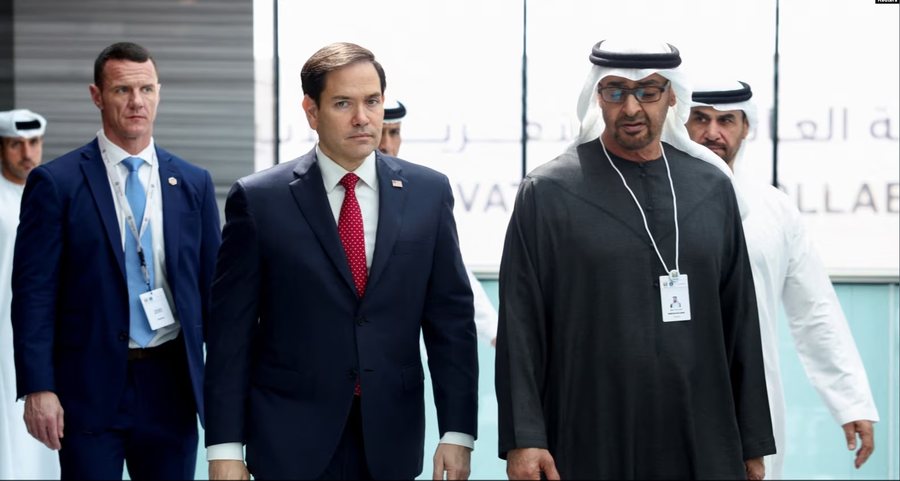
UAE President Sheikh Mohammed bin Zayed Al Nahyan told US Secretary of State Marco Rubio that the UAE rejects "any attempt to displace the Palestinian people from their land", as Mr Rubio paid a visit to Abu Dhabi on Wednesday.
The statements were reported by the United Arab Emirates' state media, which also reported that the president underlined the need to prevent the conflict in Gaza from escalating.
According to the same media, the President underlined the importance of rebuilding Gaza and pursuing a path that leads to a comprehensive and long-term peace, based on the two-state solution, as the only way to guarantee regional stability.
Arab leaders have rejected plans suggested by United States President Donald Trump for Palestinians to leave Gaza for other countries in the region and for the US to take control of the Palestinian region and rebuild it.
Secretary Rubio's visit was part of a multi-country tour that also included talks with leaders in Israel and Saudi Arabia. The visit came as the first phase of a ceasefire agreement between Israel and Hamas in the Gaza Strip enters its final weeks.
Hostage release
A senior Hamas leader said Tuesday that the militant group plans to release six more Israeli hostages being held in Gaza on Saturday. He also announced that it will hand over the bodies of four hostages on Thursday.
Hamas leader Khalil al-Hayya made the surprise announcement in a recorded statement, which was seen as a reaction to Israel's decision to allow long-sought portable homes and construction equipment into the Gaza Strip.
The six hostages are the last group to be released under the first phase of a ceasefire that expires in early March, while Hamas is believed to still be holding about 70 other hostages, half of them alive. Four more hostages are expected to be returned next week.
So far, during the ceasefire, Hamas has released 24 hostages and Israel has released more than 1,000 Palestinian prisoners.
However, the warring parties must now negotiate the second and more difficult phase of the ceasefire. Hamas says that in this phase it will release the remaining hostages only in exchange for a permanent cessation of fighting and a complete withdrawal of Israeli troops from Gaza.
Meanwhile, Israel has not backed down from its goal, supported by the United States, to eliminate any military or governing role of Hamas in Gaza.
Israeli Foreign Minister Gideon Saar said Tuesday that Israel is ready to begin negotiations on the details of the second phase. Those talks were supposed to begin two weeks ago, under the ceasefire agreement.
In his comments, Hayya said that the "Bibas family" would be involved in the handover of the four bodies, likely referring to Mrs. Shiri Bibas and her two young sons, Ariel and Kfir, who for many Israelis also symbolize the hostage battle.
Israel has yet to confirm their deaths, and Prime Minister Benjamin Netanyahu's office has urged the public not to share "photos, names and rumors." Israel has expressed deep concern about the fate of the Bibas family, while Hamas said they were killed during Israeli shelling early in the war. Yarden Bibas, the husband and father, who was kidnapped elsewhere, was released this month.
Kfiri, who was 9 months old at the time of his abduction, was the youngest hostage taken by Hamas on October 7, 2023, during the attack on Israel that sparked the 15-month war. Video footage from the abduction shows Ms. Shiri wrapping her red-haired sons in a blanket as armed men led her away.
"We have been shocked in recent hours after the Hamas spokesman's announcement about the return of Shir, Ariel and Kfir this Thursday as part of the release of the kidnapped civilians," the family said in a statement. "We find it important to state that we are aware of these reports but that we have not yet received an official announcement on this matter."
"Until we receive accurate notification, our journey will not end," the family declared.
An Israeli official said Prime Minister Netanyahu has allowed the entry of portable homes and construction equipment into Gaza to expedite the release of hostages. Last week, Hamas threatened to delay the release of more hostages, citing the portable homes issue and other violations of the ceasefire agreement.
Israel is expected to continue releasing hundreds of Palestinian prisoners, including many serving life sentences for carrying out deadly attacks, in exchange for hostages.
Hamas, an organization designated a terrorist organization by the United States, killed about 1,200 people in the October 2023 attack and kidnapped about 250 others. More than half of the hostages have been released as part of preliminary ceasefire agreements, while eight were rescued through military operations.
Israel's air and ground war has killed more than 48,200 Palestinians, most of them children, according to the Gaza Health Ministry, which does not give the number of militants killed. The Israeli military says that figure includes 17,000 militants. Entire swaths of Gaza have been destroyed and the offensive has displaced most of Gaza's 2.3 million residents. VOA (A2 Televizion)











